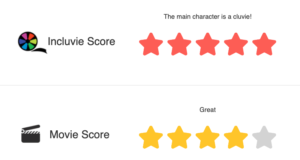Millennial Woes Done Right
A messy millennial in an on-and-off relationship with liminal job prospects has been a saturated archetype since Lena Dunham stretched it to its limit for 5 years in her series Girls. It has been haphazardly recreated in many character study-esque television series and tries to worm its way in as b-plots in coming-of-age films. Occasionally it demonstrates the nuanced fragmentation of love in a confusing world of blurred relationship boundaries and dying hopes in the gig economy. More often it gets reduced to shallow deep-fakes of toxic relationships with graphics of text bubbles and blaming the woman at the center of the narrative for her poor choice in a partner. However, the female-fronted film Shiva Baby takes a fresh perspective on the trope that mirrors experience and compels emotion in this dizzying dark comedy.
The film follows down-on-her-luck college graduate Danielle’s (Rachel Sennott) day at a shiva featuring her obliviously overbearing parents, bubbies with invasive advice, and her manic ex-girlfriend. Oh, also her sugar daddy — plus his wife and baby she wasn’t informed about. (For the goyim who don’t know, a “shiva” is a 7-day mourning period after a funeral. Basically a week-long after-party for the living without any of the fun but plenty of the snacks.) While that sounds like a somber setting to explain the evolutions of romantic, sexual, and familial relationships, a confined space for the grieving is actually perfect in expressing the restrictive ideas of elders and the frightening idea of being static in one’s life. The deliberate editing and camerawork juxtapose this in an anxiety-provoking way, with abrupt cuts and head-nodding shakes, that often places you in the scene and leaves your brain viscerally rattled by experiencing her anxiety second-hand.

The primary story between Dani and Max (the December to her May) is so craftily done without on-the-nose dramatics and avoids falling into repetitive arches, especially those about infidelity or sex work. She is not the “homewrecker” who brings the destructive revelations to light or seems to be engaging in sex work in a desperate attempt to survive. She doesn’t even have the ever-prescribed daddy issues for a sex worker character, but rather has a toxic relationship with her mother if anything. Even the “other woman”, Kim (played by Dianna Agron), doesn’t get outwardly jealous or vicious when her suspicions become too obvious to ignore. Instead, Agron gives a tremendous performance in her small role with a piercing togetherness that refuses to be broken (or acknowledged) despite the cheating man stuck at her side.
Even Max is not shown to be sleazy but is presented as a “nice Jewish boy”, as Dani’s parents describe him. On the surface, Max has a successful job, a wealthy family, a beautiful wife, and a darling baby. However, his sexual exploits reveal a lasting theme in the film that appearances, no matter how immaculate, are filled with cracks if looked at closely enough. We first meet Dani and Max after one of their sexual encounters. Surprisingly, he is quite affectionate towards Dani and talks about how he wants to financially support a young woman going to law school. He has convinced himself that what he is doing is a good deed rather than an exploitative deed that belies his perfect paternal image. The film doesn’t hold back in calling out his performative “support” since he doesn’t actually care about the power imbalance that is the foundation for the whole relationship. The subtle acting and dialogue (that expertly relies on overhearing conversations and subtextual pleasantries) show the lack of accountability and acknowledgment that is being taken — and most likely never will be. Image is everything, and Dani’s commitment to keeping up everyone else’s plus her own is faltering.

Danielle is presented as somewhere between a child and woman, displaced and disparaged at the thought of her two worlds colliding with a humanizing portrayal of her experience. She is ill-prepared to be thrown into the world of 9–5 with her “business of gender” major, feeling directionless and attempting to maintain a lifestyle through the increasingly popular industry of sex work. She is trying to carry this enormous secret on her back while balancing the dual disappointment and coddling by her parents at her every turn. On top of this, her much more successful ex, Maya, is there, which causes constant academic comparisons that haunt each conversation as well as her previous “failures,” like her weight loss, to be rehashed. Essentially, she is only in her early 20s and feels the pressures of trying to have it all in a world aimed against those who will inherit it.
Listen to your mother and don’t marry anyone til you’ve slept with what, at least 10 people…Because you’re gonna end up with one, and you’ll be wiping his arthritic ass for the rest of your life.
What writer-director Emma Seligman gets so right about this story is the suffocating cynicism that occurs in the maturation and transition into adulthood. In a world that is aging so terribly, the younger generations get the burden and repercussions of failing traditionalism and the trauma alongside that — despite the expectation to rise against it. Nowhere brings that to light better than when old meets young, wife meets mistress, causing feelings to be confronted, guilt to bubble, and letting to be (inevitably) downed. What is the solution? Well, spoiler alert, there isn’t one that Seligman presents. Through this claustrophobic maze of disappointment and web of lies, the question that remains to linger is how is Dani supposed to go up when everyone around her is pushing her down?

The diversity aspect of the film is worth paying attention to. Emma Seligman wrote and directed the film after recently graduating from NYU and basing it off her thesis of the same name. It features a diverse, female-led crew and a cast made up of primarily older women (who are often hidden on-screen). A bisexual, Jewish, and female protagonist provides a new kind of representation seldom seen before and the film itself is driven only by the female characters, while the men get more passive roles. It even touches on issues of micro-aggressive homophobia with Dani’s mother bragging about how “open-minded” she is but telling Dani not to hook up with her ex at the shiva. My main criticism of the film is that it would’ve been nice to feature some more Jewish people of color since they are often excluded in representations of Judaism. With a film as excellent as this, I’m sure this will be remembered as a crucial film of youthful Jewish representation in cinema.
Shiva Baby is one of those films that makes me excited about the new millennial and Gen-Z filmmakers emerging from the independent scene to breathe fresh life into scenarios and scenes that those divorced from these generations and experiences have failed to adequately provide. The film’s nuanced take on tired tropes captures the millennial experience without putting down sex workers or trying to romanticize our reality. It portrays feelings on-screen without verbalization and makes empathizing intrinsic for the audience. Emma Seligman is a filmmaker to watch out for.
Click here to watch the original short that the movie was based on.

More to explore
By Same Author
Related lists created by the same author
By Cluvie Type
Related diversity category
'Priscilla' (2023)
This drama film is about Priscilla and Elvis Presley's failed marriage through the lens of the title character.





